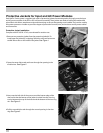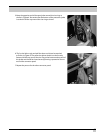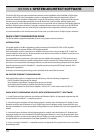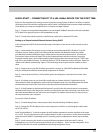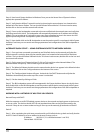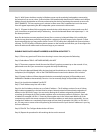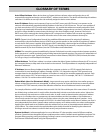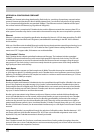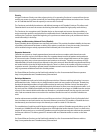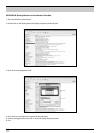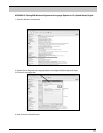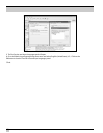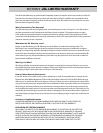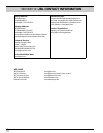
32
VERTEC User’s Guide
APPENDIX A: CONFIGURING COBRANET
General
CobraNet is a licensed technology developed by Peak Audio, Inc. consisting of proprietary communications
protocol, firmware and hardware. It allows reliable, deterministic (i.e. real-time) transmission of high quality
(i.e. un-compressed) digital audio over standard 100Base-T Fast-Ethernet network. CobraNet will also oper-
ate on faster versions of Ethernet (e.g. Giga-bit and 10Giga-bit).
A CobraNet system is comprised of CobraNet devices and the Ethernet network that connects them. PCs or
other system controllers may also be connected to the network for setup but are not required for operation.
Ethernet
Ethernet is a hardware and signaling specification developed by Xerox in 1970 for data networking. The IEEE
(Institute of Electrical and Electronics Engineers) standardized the technology in the IEEE 802.3 standard
and its variants.
With over 50 million nodes installed, Ethernet is easily the most dominant data networking technology in use
today. It is carried over inexpensive CAT-5 UTP cables or fiber. Typical Ethernet cabling limitations are: 100
meters over CAT-5 copper cable, 2 kilometers over multimode fiber.
The CobraNet™ Device
Each CobraNet device embeds specialized hardware and firmware. The hardware includes a standard
100MB Fast-Ethernet interface along with custom high-speed DSP chips and clock circuitry. The DSP and
its embedded software are used to encode and decode the Ethernet network messages using the propri-
etary protocol. The clock circuitry is used to accurately decode the system master clock timing needed for
high-quality real-time audio delivery.
Audio Specs
All CobraNet devices operate at a fixed sample rate of 48kHz. The audio data may be transmitted at 16, 20
or 24 bit data as desired. For reliable operation, each CobraNet device must implement transmit and receive
buffering. This buffering is fixed at 256 samples and results in a minimum audio network latency of 5.333ms.
(256 samples at 1/48kHz per sample)
Bundles and Audio Channels
Routing of digital audio between CobraNet devices is accomplished through Bundles. A Bundle is the name
given to the proprietary encoded message (a.k.a. “packet”) transmitted between CobraNet devices that in-
clude multiple channels of digital audio. Each CobraNet device can transmit and receive up to four Bundles.
Each Bundle includes up to 8 Audio Channels. Therefore, each device is capable of transmitting and receiv-
ing up to 32 Audio Channels to and from the network.
Bundles can be transmitted using Ethernet multicast or Ethernet unicast methods. Multicast Bundles are
sent to all CobraNet devices on the network, while unicast Bundles are sent to one and only one CobraNet
device. Since each device can send and receive four Bundles, great flexibility is allowed in the routing of
audio over the network. Up to 8 multicast Bundles (64 Audio Channels) can be transmitted on a simple re-
peater based Ethernet network. Up to 4 multicast Bundles (32 Audio Channels) along with up to 421 unicast
Bundles (>3000 Audio Channels) can be transmitted simultaneously on a full-duplex switch-based CobraNet
network.
Assignment of Bundles is accomplished through the selection of a Bundle number. Bundles between 1-255
are always multicast, while Bundles between 256 - 65,279 are unicast. Bundle assignments must not be
duplicated. Only one CobraNet transmitter is allowed per bundle.
The Conductor
On a CobraNet network, the Conductor coordinates transmission of audio packets throughout the entire
network. When two or more CobraNet devices are interconnected properly, one of them will be selected the
Conductor based on their respective Conductor.



